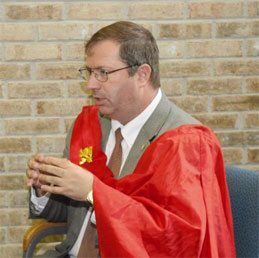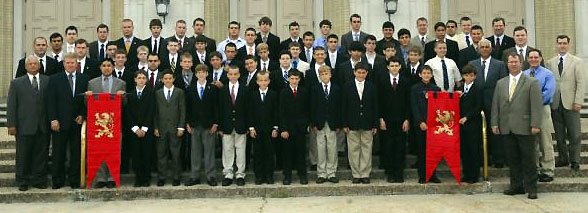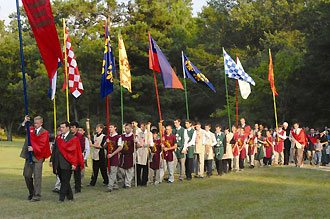Crusade Magazine thought our readers might enjoy the background regarding the annual TFP Call to Chivalry Summer Camp that is held in Norwood, Louisiana. The camp is the innovation of TFP-Louisiana President Thomas Drake, who shares with us his thoughts and insights behind this endeavor.
* * *
Crusade: What motivated you to organize the TFP Call to Chivalry Summer Camp?

Mr. Drake: Ever since Louisiana became my adopted home, I could not help but notice how the same moral and spiritual crisis afflicting the rest of the world was at work here. This social and family reality is very disturbing and certainly beyond any one person’s capacity to solve. So I took this before Our Blessed Mother and, after much reflection and prayer, I felt the strength to act on an inspiration.
That inspiration was to organize something that would help form young Catholic lay leaders in order to send them out on campuses throughout the South. Why not take something the TFP is already doing quite well and build upon it? The American TFP has been putting together student summer programs since the early 1970s, so I thought, “Why not bring this educational experience to Louisiana?”
When I began preparing for the first Call to Chivalry camp in Louisiana for 2002, Divine Providence provided Mr. Richard Lyon, a former headmaster at St. Louis de Montfort Academy and veteran TFP member. Mr. Lyon was well versed in Saint John Bosco’s methods in youth formation, which is very valuable for putting this together. Later on, Mr. John Ritchie of TFP Student Action and Mr. Matthew Shibler gave, and continue to give, dedicated and valuable help to the Call to Chivalry Summer Camp.
Crusade: Why a Call to Chivalry?
Mr. Drake: Within the various TFP organizations throughout the world, we strive to live the spirit of chivalry that is rooted in the Catholic Faith. This spirit conflicts with today’s culture that is immersed in what the late Pope John Paul II called the “culture of death.” We need to restore to America those ideals of honor, faith, generosity, self-abnegation and courage. Our country desperately needs a restoration of these ideals that are the foundation of a Christian civilization and culture.
Crusade: What is a typical day like at the TFP Summer Camp?
Mr. Drake: There is a basic daily schedule and then a broad range of activities that fits within that schedule. During these 11 days of camp, we have many outdoor activities. There is also an annual Treasure Hunt for a 200-pound treasure chest, which demands superb map-reading skills and teamwork, and there is a tough hike on a trail in the Tunica Hills area with its waterfalls. Some years there will be field trips to Civil War battlefields or museums in the area.
Now these vigorous physical activities are mixed with an equal dose of mind- and soul-stimulating lectures, debates, and talks on Catholic history and the heroes of the Faith. There is also time for prayer, reflection, Rosary processions and other Catholic devotions.
Furthermore, one cannot forget the annual Fourth of July fireworks on the Mississippi River, which we watch from the U.S.S. Kidd where American sailors gave their lives for our freedoms.
Crusade: Do you stress involvement from the fathers?

Mr. Drake: Yes. Owing to the pressures of our postmodern lifestyle, most fathers spend too little time with their sons. I want the fathers to participate as much as they possibly can, and I do everything I can to make this happen. It does good for a son to see his father praying the Rosary with other men, and the fathers too benefit from the camp.
Crusade: Are the rest of the family included?
Mr. Drake: As our name suggests — Tradition, Family, Property — we strive very hard to defend the institution of the family. The family, based on the sacrament of marriage, is under relentless attack in modern society, and one of the reasons for this TFP summer camp is to help strengthen Catholic families in Louisiana and the South.
Our Faith teaches us that we are united through the Catholic Church as one large family in the Mystical Body of Christ. With this in mind, I think the most important weekly event for any Catholic family is to attend Sunday Mass together. So I always extend an invitation to the families of our campers to meet us in Baton Rouge for the Sunday morning Mass at St. Agnes Church.
Crusade: I understand you also invite parents to the final day of camp for the Medieval Games and, the grand finale, the Medieval Banquet. What are the Medieval Games and the Medieval Banquet like?

The Medieval Games begin as the young men, wearing their very own livery, join their respective regiments. The heat of competition is intense. Each team has its captain, patron saint and battle cries like “Saint Michael, pray for us!” or “Long live Christ the King!” When the games end, then the obstacle course begins. This year’s obstacle course was inspired by the U.S. Navy SEALs for teamwork: a four-man team gets its canoe through the obstacles on land and in the water. Then the young men shower and don their finest. Our young participants line up for the final Rosary procession, and take their warrior appetites to the not-to-be-missed Medieval Banquet, which is held in a pavilion decorated with Persian rugs, banners, shields, swords and halberds.
This is a real feast! The mothers, fathers and TFP members spent days planning and preparing the feast. The tables are set with fine china, glasses and candelabra. Meanwhile, the fathers have been working hard to prepare food fit for royalty: a 100-pound couchon de lait roasting for the past nine hours in a Cajun oven, along with deep fried turkeys, Texan briskets, Polish and Italian sausages, and countless side dishes. Finally, a “castle cake” appears for dessert.
The closing of the evening has Monsignor Robert Berggreen blessing the mementos of that year’s Summer Camp, which he then gives to each of the young “knights” as they are called up. There are also the trophies for the chess and other tournaments. There are final speeches, prayers and farewells.
Crusade: What are the mothers saying about the Call to Chivalry summer camp?
Mr. Drake: After the first year, one of the mothers phoned to thank me, and she told me her son not only enjoyed himself but was proudly showing his sisters how to tidy the bedroom. This delighted his mother who insisted emphatically that TFP should have a monthly weekend for the boys “to continue the good done by the Summer Camp.”
Another mother, whose college-age son helped out with the 2004 Summer Camp, said she was overwhelmed when her son held the door for her as if he had been doing it all his life. She exclaimed, “Thomas, you have no idea what that means for a mother! He never did that before!”
These comments are personally rewarding to hear. They demonstrate the abundant graces and blessings Our Lord is bestowing on families touched by these camps. They also show that Catholic culture and civilized manners can make a comeback.
Crusade: Now, each year the Call to Chivalry has an historical theme, does it not?
Mr. Drake: Yes. While the overall theme each year is a Call to Chivalry, each particular camp also highlights a particular theme. Each year, I choose an historic episode that illustrates virtues of courage and leadership in situations of “impossible odds.” Our youth need examples in order to help them develop their character, expand their horizons, and inspire their minds and souls with noble deeds. This year, our historic theme was the Mexican Cristero martyrs who gave their lives to preserve the Catholic Faith against the Mexican Communists during the 1920s and 1930s.
Crusade: Give us an idea of how you were able to bring the Cristeros theme to life for the boys during this year’s summer camp.
Mr. Drake: We try to recreate the atmosphere of rural Mexico so our campers can feel what it must have really been like to live the life of Father Miguel Pro and the Cristeros during the 1920s and what it must have been like to hear the Cristeros shout their famous battle cry, “¡Viva Cristo Rey!” (“Long live Christ the King!”)
You’ve heard it said that a picture says a thousand words. So we hung in the conference hall two life-sized posters of Father Miguel Pro and Luis Segura Vilchis at the hour of their martyrdom. There was also a wonderful talk on the Kingship of Christ, which explains why our heroes’ last words were “Long live Christ the King.”
All this climaxes toward a special “Cristero Night,” when we eat Mexican food and sing Cristero songs and songs to Our Lady of Guadalupe, La Guadalupana. Later that night, the torchbearers and those leading the Rosary procession wear ponchos emblazoned with the image of our Lady of Guadalupe.
